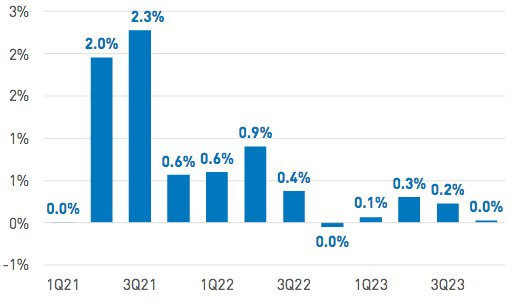According to the US industry association IPC, the current economic outlook remains modest - even if the gloomiest forecasts do not appear to be coming true.
In its 'May 2023 Economic Outlook', the industry association, which is influential in the electronics manufacturing segment and has its headquarters in Bannockburn, Illinois, predicts that the global economy will cool down over the course of the year - albeit not as severely as initially expected. However, the relatively weak growth in 2023 is likely to decline even further in 2024.
According to the IPC, the labor markets are currently extremely robust - despite the general impression that a global recession is imminent. Both the USA and Europe are experiencing record low unemployment rates. In the USA, the number of job vacancies grew by 358,000 in April to a total of 10.1 million. The level of consumer prices was 4.7% higher than in the previous year. This and the substantial rise in wage costs indicate that inflationary pressure remains high.
Looking at the US economy in particular, IPC Chief Economist Shawn DuBravac states: "Consumer sentiment fell sharply last month, wiping out half of the gains since June 2022. Business sentiment is also dismal. The outlook for the manufacturing industry is subdued in both the US and Europe. Key indicators suggest that there is a high risk of a recession this year, even if the timing could postpone this to the end of the year."
Here is some data from the IPC (Association Connecting Electronics Industries): The purchasing mood of US consumers fell by almost seven percent in May 2023. The tense debate surrounding the US federal budget deficit has contributed to this deterioration. And sentiment among US manufacturers has deteriorated continuously for five months in April. The Purchasing Manufacturers' Index (PMI) rose slightly by 0.8% in May - not enough to speak of an expansion in demand.
Only modest growth
According to the IPC, the same applies to the eurozone, where the manufacturing PMI fell to 45.8 in April, where it has remained for ten months. In other words, below the neutral value of 50 between contraction and expansion. This reads as a recession. The production volume of industry also fell in April, as did the volume of incoming orders. According to the IPC, the European economy still grew by 0.1% in the eurozone and by 0.2% in the EU as a whole in the first quarter of 2023. Poland recorded the highest growth of 3.9% compared to the previous quarter. Portugal by 1.6% and Cyprus by 0.8%. Spain, Italy and Latvia each grew by 0.5%. The Netherlands fell by 0.7%, Austria by 0.3% and Ireland by 2.7%.
 Economic growth in Europe: real GDP (quarterly development)
Economic growth in Europe: real GDP (quarterly development)
Economic growth 2023 (changes in GDP) | Economic growth 2024 (changes in GDP) | |
Eurozone | 0,7 % | 1,2 % |
Germany | 0,2 % | 1,2 % |
France | 0,5 % | 1,1 % |
Netherlands | 1,0 % | 1,2 % |
The US situation in terms of GDP growth (gross domestic product) is more positive. The IPC puts its real growth in the first quarter at 1.3 % for the current year. The driver for this is consumer spending, with an increase of 3.8 % in the first quarter. Business investments rose by 1.4%. The "core" GDP, i.e. consumer spending, business investment and residential construction, rose by 3 % in relation to the current year. However, the export volume in the USA is still pointing downwards.
In Europe, electronics production fell by 5.9% in March compared to the previous month and by 1.7% compared to the same period last year. The markets for electronic products (components, assembled printed circuit boards), communication devices and computers are also affected by the decline in demand. They shrank by 35.5% in April compared to the previous month and by 30.1% compared to the same period last year.
According to the IPC, the German economy as a whole recorded negative GDP growth in the first quarter. This supports the assumption of an ongoing recession - with an extremely low unemployment rate of 2.8%. The European inflation rate amounted to 7% in April - slightly lower than the previous year's figure of 7.4%, but significantly higher than the ECB's target of 2%.
In May 2022, IPC set up a new German branch in Munich under the name 'IPC Electronics Europe' in order to represent the interests of its members more intensively locally.





